With ChatGPT’s popularity rising towards the end of last year, 2023 is the year for using AI to improve your SEO results. With a plethora of artificial intelligence tools to take advantage of, we look at how AI is being used to make SEO processes easier, and provide you with some tips and tools to use along the way.
What is AI in SEO?
So firstly, what actually is AI? Artificial intelligence or AI for short, is a field of computer science that focuses on creating intelligent machines that are capable of performing tasks that would typically require human intelligence. This involves developing algorithms and systems that can learn and improve independently, therefore creating an environment that can emulate human intelligence.
Currently within SEO, AI can be mainly used for research and content-based tasks, but the possibilities are ever changing. Below, we go into more detail about the key areas where OpenAI’s well-known AI tool, ChatGPT, can currently be used in SEO.
How To Use ChatGPT For SEO
1. Keyword Research
Solid keyword research should lay the foundations for any SEO strategy, and in ChatGPT we can very easily generate a list of relevant keywords to target. All you need is to identify your main target keyword, in this example we have chosen ‘HR Software’. You can then ask ChatGPT to provide a list of keywords for your main keyword, and the tool will generate this for you. You can tailor this list to specific countries too, in our example we asked for UK based keywords.
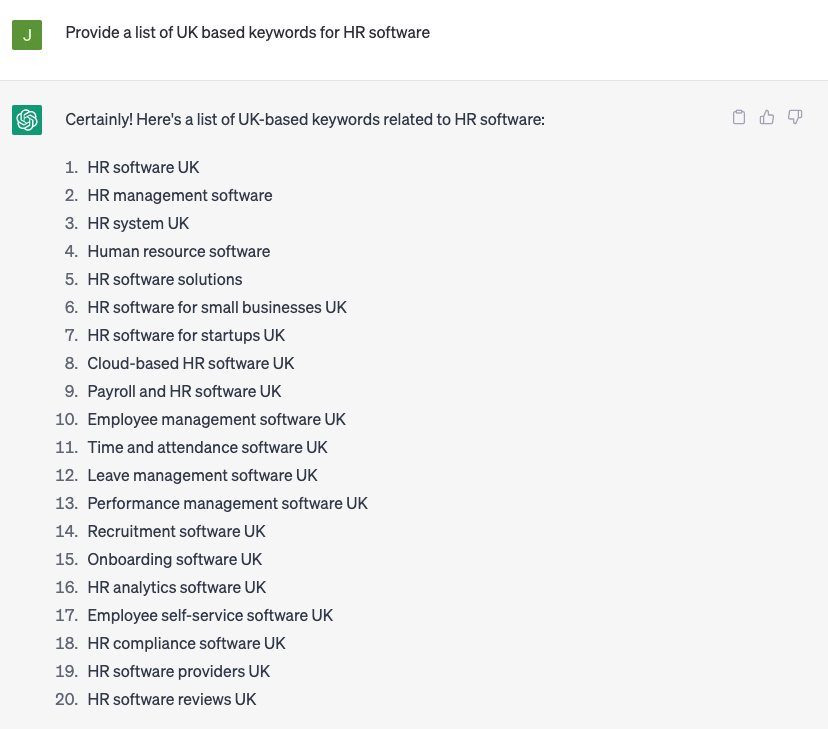
Unfortunately ChatGPT can’t tell us keyword specific data like search volume or rankings, so using Google’s Keyword Planner, or third-party tools like SEMRush or Ahrefs will still need to be used to obtain this information. However the ChatGPT keyword list can give you a base foundation to work from.
ChatGPT Command: Provide a list of [insert country] based keywords for [insert main keyword]
2. FAQs
Alongside keyword research for top level terms, we can also ask ChatGPT to provide us with a list of FAQs. This can help give you an idea of what long tail keywords, and question-based queries you can target on your website. Simply ask ChatGPT for common questions about your main keyword, and it will generate a list. These can be used on an FAQ page, or could provide an idea for a potential blog post.
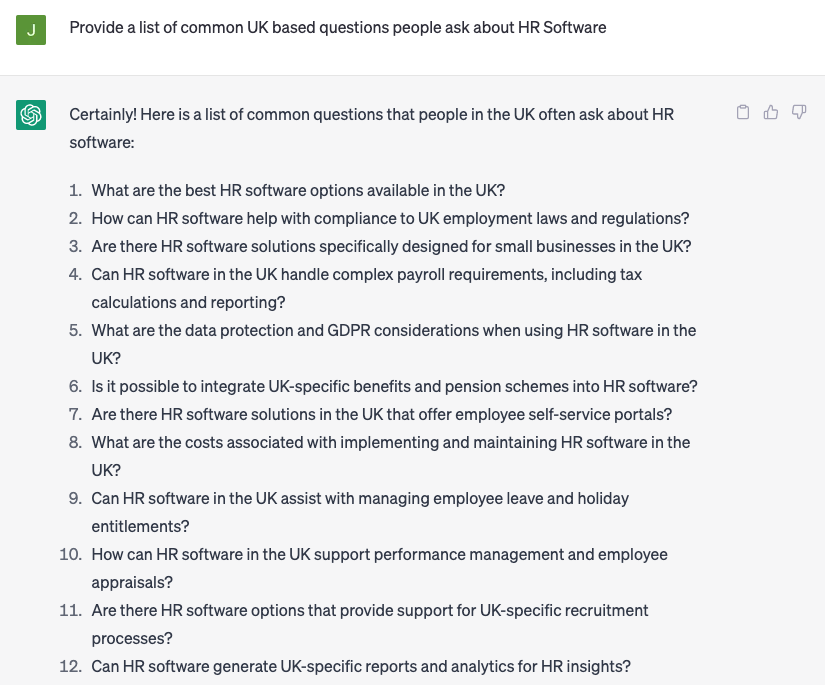
ChatGPT Command: Provide a list of common [insert country] based questions people ask about [insert main keyword]
3. Content Strategy
If you’re looking for fresh new ideas for your content strategy, ChatGPT can help with that too! All you have to do is simply ask the tool to provide you with a list of topics to write about your main keyword, and suggestions for the types of content to share that information.
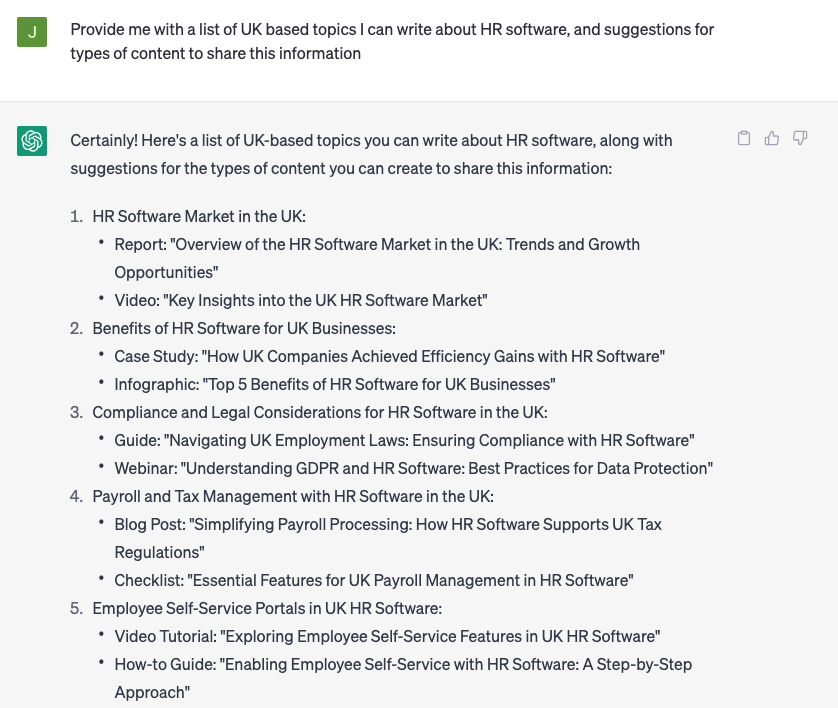
This can be done not only to benefit SEO on a website, but for other marketing channels like Social Media too.
ChatGPT Command: Provide me with a list of [insert country] based topics I can write about [insert main keyword], and suggestions for types of content to share this information.
4. Blog Templates & Content Creation
So you’ve got an idea for a blog article you want to write, however you’re unsure on how to best structure it. Well ChatGPT can help you with that too! By asking the tool to outline a blog template for your blog title, it generates a well structured outline for you to work from.
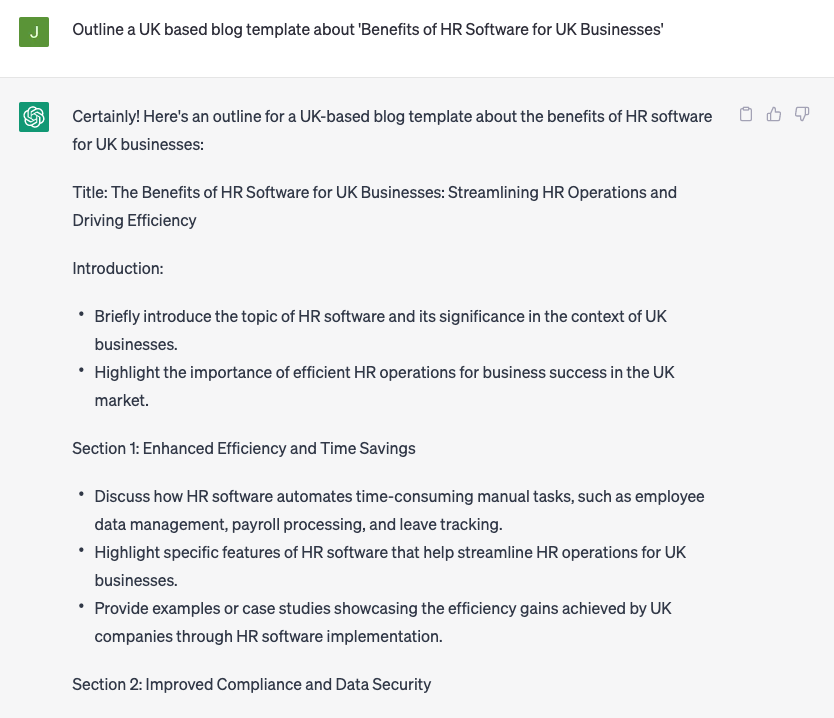
You’ll be given headings for each section, alongside a brief overview of what to write to help streamline your blog writing process.
ChatGPT Command: Outline a [insert country] based blog template about '[insert blog title]'
ChatGPT can also be used to generate whole paragraphs of content for you to copy into your blog post. However, this is something you should be careful with. ChatGPT can sometimes provide inaccurate information, and content generated could be plagiarised from different sources, which would negatively impact your SEO.
So if you’re generating content through ChatGPT, you should always only use this as a basis of information to work from, ensuring you’re refreshing the content to give it its own unique feel.
5. Meta Titles & Descriptions
Coming up with a good meta title and description can sometimes be tricky. ChatGPT can help give you ideas for meta titles & meta descriptions.
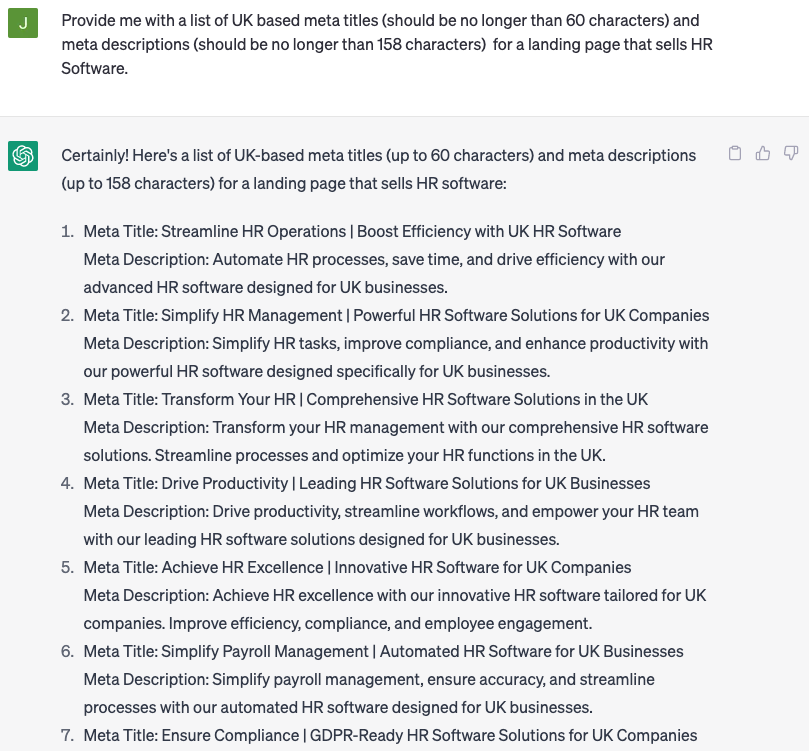
This list should only be used as a basis to work from, as it’s important you ensure your meta title and description still align with your brand’s tone of voice. Also you will need to ensure you’re still effectively targeting specific keywords where relevant in your meta titles and descriptions, so making the right adjustments is necessary.
ChatGPT Command: Provide me with a list of [insert country] based meta titles (should be no longer than 60 characters) and meta descriptions (should be no longer than 158 characters) for a landing page [insert information for the landing page is about].
6. Outreach For Backlink Opportunities
Putting together a great outreach email for backlink opportunities can determine whether you do or don’t get that all important backlink.
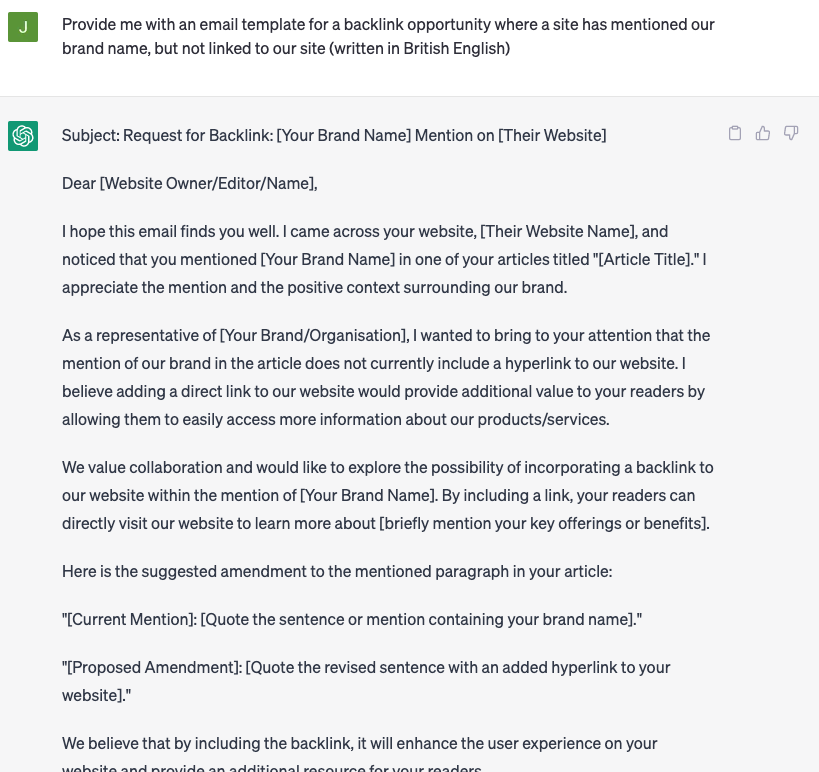
Whether you’re writing an email to request a link from an unlinked brand mention, or scoping out potential backlink opportunities from relevant articles, ChatGPT can help give you a base template for this. This ensures you’re hitting all the key points that should be covered in these types of emails.
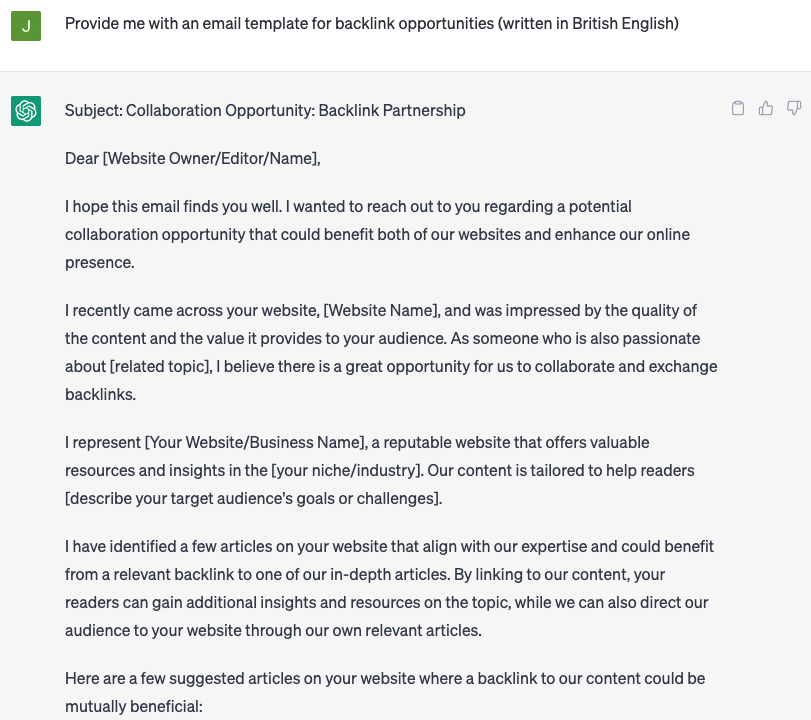
ChatGPT Command: Provide me with an email template for backlink opportunities (written in British English)
ChatGPT Command: Provide me with an email template for a backlink opportunity where a site has mentioned our brand name, but not linked to our site (written in British English)
7. Schema Markup
Schema (also known as Structured markup), is an additional layer of code that sits on a page and tells Google what kind of content the page has.
Schema also helps Google to understand the contextual relevance of a page which increases the likelihood of Google ranking the page for related queries.
If you’re just starting out with SEO, schema implementation might be confusing. Luckily, ChatGPT can help you with this too! There are lots of different markups when it comes to schema, see Google’s documentation.
Here we have assessed how ChatGPT handles writing Article schema for our latest blog post. Other than giving us the incorrect author name, the results? Pretty good.
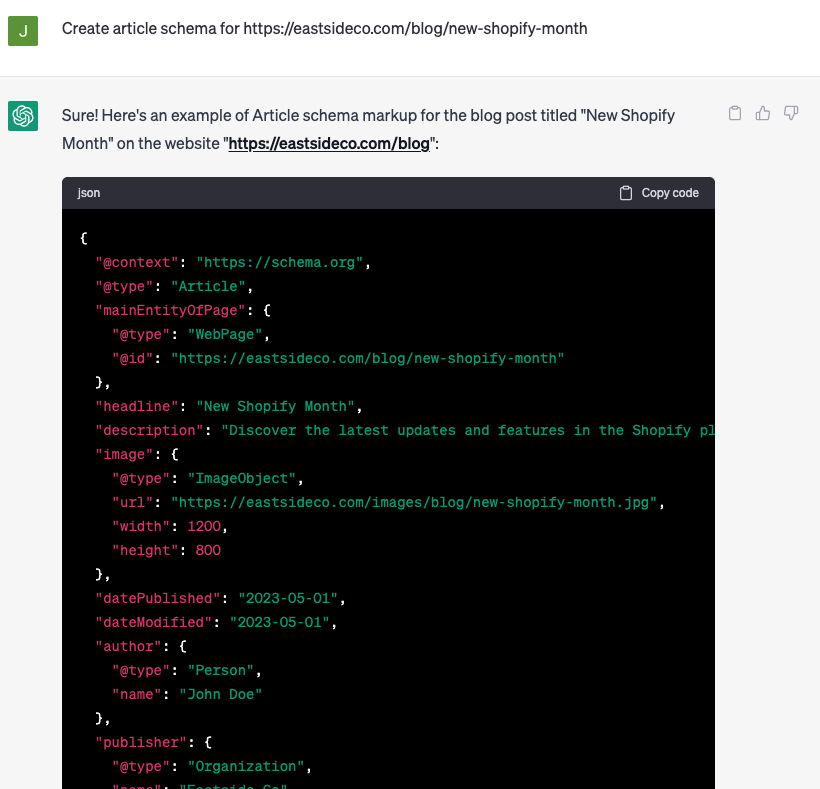
We also tested this with FAQ schema markup, and again this worked perfectly.
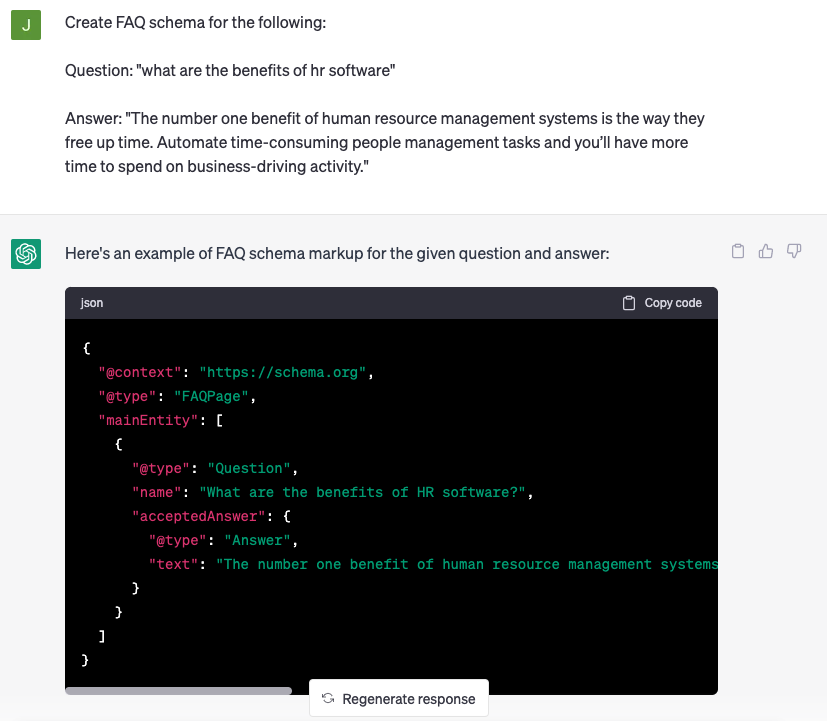
ChatGPT Command: Create article schema for [insert blog url]
ChatGPT Command: Create FAQ schema for the following:
Question: "[insert question]"
Answer: "[insert answer]"
8. Regular Expressions (Regex)
Regular Expression, or Regex for short is a sequence of text that forms a search pattern. Regex is a powerful tool when it comes to filtering data in Google Analytics or Google Search Console.
In this example we’re looking to see only clicks/impressions from SEO terms for our website.
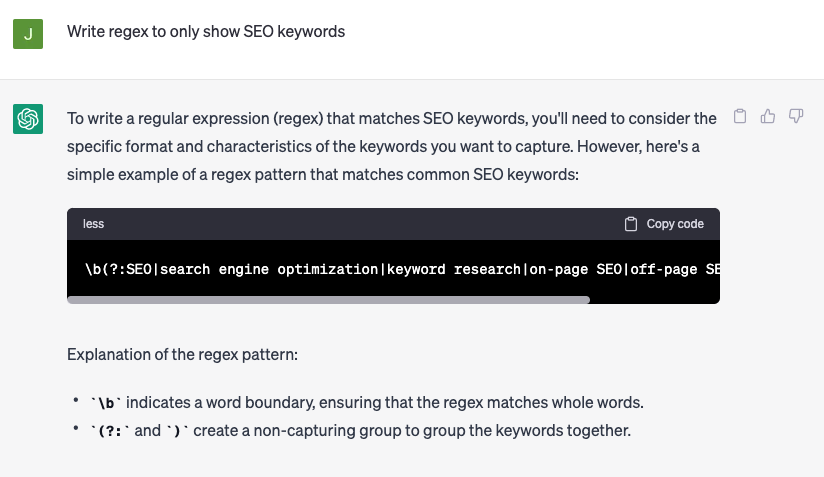
By asking ChaptGPT to write us regex to only show SEO keywords, we can take this and apply it as a query filter in Search Console. This filter now only shows us SEO related keywords in our Search Console data.
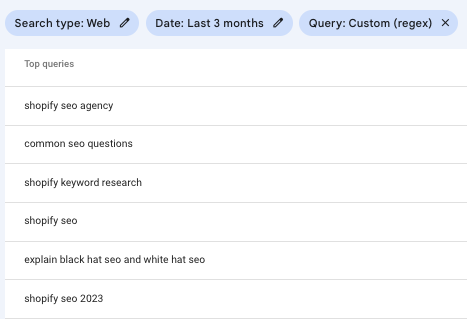
ChatGPT Command: Write regex to only show [insert main topic] keywords
How AI Will Change The Future Of SEO
As AI continues to develop, it will constantly change the SEO world. Below we touch on some key areas where AI could change SEO going forward.
Future Of Content Creation
In our ‘How To Use ChatGPT For SEO’ section, we have covered how AI can be used for content creation, but what about the future of SEO, and AI generate content?
Google put out a blog post in February 2023 called ‘Google Search's guidance about AI-generated content'. From this it seems Google is for AI generated content, which isn’t surprising considering the creation of Google’s own chatbot, Bard.
Google is insistent that it will reward high-quality content, however it is produced. But if every digital marketer was to use AI generated content to save time, then we could potentially end up with entire website’s with content that has been generated by AI, so it is unclear how future Google updates could handle this and how this could impact E-E-A-T.
The best process right now, is to only use AI generated content as a base to work from. This is so you can still give your content the right tone of voice, and make it feel unique. It’s important to identify inaccurate information, and ensure the content generated isn’t plagiarised from different sources.
Google Bard & Google SERPs
With Google recently announcing that Google Bard can now show search and knowledge panels, alongside maps and more, will Bard eventually replace SERPs as we know it?
When asking Google Bard a question it currently pulls through text-based content alongside an option to expand your search into the SERPs. However, we could see Google eventually house this all within Bard, and have other Google elements like Shopping or Images pull through.
Rankings Data
There are currently AI Tools being developed that have the capability to predict organic search rankings based on the current state of SEO on a website. Since there are many variables of SEO, these tools could be used to easily identify actions that could have the biggest impact on keyword rankings.
Future AI tools could help us better understand search engine algorithms, and why specifically one URL ranks above another. This could also include more accurate information about Google’s PageRank or E-E-A-T scores, both of which are unknown.
AI Tools for SEO
KeywordTool.io
This tool provides a wide range of keyword suggestions based on your chosen keyword, which can help you identify new alternative words to target, that may not have occurred to you.
Additionally, it provides data on search volume, competition, and cost-per-click for each keyword, making it easy to assess the value of each one.
CanIRank
This is a free AI tool that provides recommendations to help you improve your website’s SEO and ranking.
Itsalgorithms analyse your website and provide customised recommendations for on-page optimisation, content creation, and link building.
Benefits of using CanIRank for SEO analysis:
- Recommendations to improve your website’s search engine ranking
- Identify which pages on your website have the most potential for improvement
- Receive actionable recommendations for SEO improvements
- Get insights into keywords to target and which ones to avoid
- Analyse your competitor’s websites and identify areas where you can gain a competitive advantage
Frase.io
Frase is 'smart AI for smarter SEO' - it allows you to create content that ranks, with features including creating content briefs and articles, optimising conten,t and analysing existing content and uncovering new opportunities.
Semrush
Semrush is a well-estblished SEO tool that is constantly evolving to take into account the latest developments, including artificial intelligence. You can carry out keyword research, optimise on-page SEO, conduct competitor analysis, use it to improve local SEO, build links, and track keywords, in addition to its AI features.
Semrush contains powerful AI SEO tools, including a writing assistant and rephrasing tool, for optimising content in differnt locations like blogs, Amazon products, and social media posts. It can generate blog ideas and rewrite existing content for SEO optimisation. It also has a text-to-image generator, meta description creator, and FAQ answer generator, in a similar way to ChatGPT.



